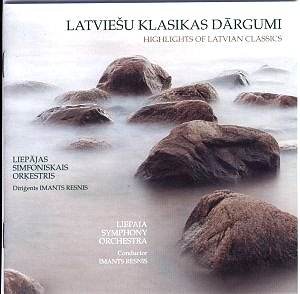Light music fans and the many enthusiasts of music that has not lost touch with melody will find this disc a great discovery. The Baltic states have resoundingly succeeded in the field of concert music and there will, I am quite sure, be much more to come.
Andrejs Achikop sounds like a cross between Schwanda the Bagpiper, a Turkish March by Sousa and Tchaikovsky's Marche Slave; light fare - a movement from Andrejs' Latvian Dances Suite. The Barcarole is for a fruitily vibrant French Horn and orchestra. The Orchestra's Arvids Klisans is to be warmly congratulated on his fine legato and his resistance to the tragically homogenised tone that has already settled on most East European orchestras and which has emasculated much of their individuality. Darzins' Valse Mélancolique is Tchaikovskian (as if lifted from a ballet), lilting, sweetly uncloying and regretful with some lovingly weighted woodwind writing. Imants Resnis and the Liepaja players deserve much credit for their pliant and mercurial response to changing tempi and dynamics. Janis Medins' Aria is from Suite No. 1 (1922-24). Its theme is akin to one of Balakirev's finer inventions but with a cool Baltic twist. His Flower Waltz is from the ballet The Victory of Love (1936). The style is of a piece with Darzons' and with the preceding piece Kalnins' Autumn. The Kalnins is nowhere near as invigorating as the crackling orange leaf-drifts of Glazunov's Autumn. His respectful reflective perspective is shared with the Tchaikovsky. The orchestration of this movement dates from 1941. Up to this point everything has been balletic and light on the palate; the stuff of light orchestras the world over if only such orchestras knew of these skilled and tender pieces. Jekabs Medins' Legend is part Sibelian (Rakastava, Valse Triste) and part Gliere. At 7.30 its understated emotion is tends to outstay its welcome.
Ivanovs Cello Concerto is represented by the middle movement of seven minutes. The whole work is not exactly epic running to circa 20 minutes - the same length as the Pfitzner No. 1 and the Korngold. It dates from 1938 and this movement The middle movement sings in auburn colours somewhat emulating the recessed emotional tone of the Dvorak Cello Concerto but rising to a climax of hoarse and (strangely) Hispanic passion. The Introduction and Valse from Ivanovs' music for the 1956 film Frost in Springtime is poignant and intense with the passionate and tragic burden taken by the violins. This score was written during the 'Khruschev Thaw' of the mid-1950s. The memorable Wedding Waltz has blended into it a vigorous tail-flourish to suggest that sedate waltz steps are topped off by some vigorous folksy footwork. The oompah ostinato may well have been part inspired by Prokofiev. This piece links back to the Medins, Darzins, Andrejs and Kalnins tradition.
The works by Imants Kalnins, Peteris Vasks and Romualds Kalsons bring us into and almost out of the 1970s. The second movement of Kalnins' Fourth Symphony (1973) is like a diesel-soaked nostalgic mirage where the unfeigned delight in jewelled beauty apparent in the Darzins and Medins tradition is synthesised through modern disillusion and juxtaposed with factory-age brusqueness. This is extremely striking music and the softened stabbing bird cries of pleasure and pain will live with you. I am not at all surprised by the popularity of this work. The Kalnins is followed by Vasks' Cantabile for strings, the latest piece on the disc. This brought flooding back memories of Valentin Silvestrov's Fifth Symphony and of Alan Hovhaness. Vasks' produces slow and fast cascades of ecstatically interleaving divisi string tone usually buzzing high and in the register. Kalsons' Wedding Song is 'Friday Night is Music Night' or 'Boston Pops' material - a knees up in which Gliere and Copland meet in unashamed high spirits.
Helpfully the booklet is in both Latvian and English and is tastefully designed and illustrated.
A no compromise sampler drawn in the approachable vein in Latvian music. Get it if you and very highly commended.
Rob Barnett
AVAILABILITY
Baltic Shop.com LLC
1616 Post Road Suite 5543
Fairfield CT 06430
USA
info@balticshop.com
phone (within USA) 1-800-506-2312
phone (outside USA) +371-928-6434
fax 831 303 3619
Note also UPE Recoridng Company
13 Skanstes
Riga LV-1013
LATVIA
upe@radioswh.lv
www.upe.parks.lv
